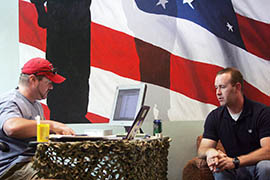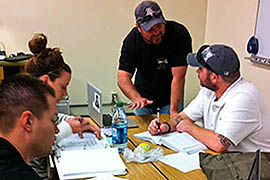Cronkite News has moved to a new home at cronkitenews.azpbs.org. Use this site to search archives from 2011 to May 2015. You can search the new site for current stories.
Tillman Foundation pulls scholarship over “misleading” application
WASHINGTON – This much is known about Glen Lacroix: He is a decorated Army veteran who won a prestigious Pat Tillman Foundation scholarship in 2010 and led veterans’ organizations at the University of Arizona.
This is also known: The Tillman Foundation canceled his scholarship earlier this year, citing “misleading and inaccurate” information in his application, and that statements he made about his service – that he served in Iraq and Afghanistan and was wounded three times there – are inconsistent with Army records.
What is not known is why Lacroix, a veteran who earned several military decorations, might have made the statements that are now being called in to question.
“I don’t understand, because the gentleman had a wonderful service record,” said Raymond Gall, public affairs officer for the Army Human Resources Command at Fort Knox, Ky. “I don’t know why you wouldn’t be proud of what’s listed here (in Lacroix’s service record).”
Lacroix did not respond to email requests, sent to several different accounts, for comment about his military record. Acquaintances who were contacted said Lacroix was no longer in touch with them and University of Arizona officials could not provide a phone number or address for him.
But Matt Randle said he was “shocked and sad” when he heard that questions had been raised about Lacroix’s record.
Randle was director of the Veterans Education and Transition Services (VETS) office and president of the student veterans organization at the University of Arizona when Lacroix enrolled there in 2009.
“He did a great deal of good and he helped a great deal of people,” Randle said of Lacroix. “He was an integral part of us becoming the No. 1 veterans’ center in the country.”
University of Arizona spokesman Chris Sigurdson said privacy laws prohibited him from commenting on Lacroix’s student records or any student employment, such as work-study positions in the VETS office.
“We can’t say anything about anything,” Sigurdson said.
The university registrar’s office was able to say that Lacroix, who received his bachelor’s degree from the university in 2012, is currently enrolled in graduate school there for a master’s degree in counseling and mental health.
Lacroix was one of 59 candidates selected in 2010 as a Tillman Military Scholar, a Pat Tillman Foundation program that helps veterans and their family members complete their college degrees. The program, and the foundation, are named for the former Arizona Cardinal who set aside football to volunteer for the Army after 9/11 and who was killed in action in Afghanistan in 2004.
In the year Lacroix was picked, the scholarship program provided a total of more than $700,000 to the 59 scholars to supplement the GI Bill or other educational benefits. But earlier this year, the foundation learned information in Lacroix’s application was “misleading and inaccurate,” said foundation spokeswoman Michelle McCarthy.
“The Pat Tillman Foundation holds all Tillman Military Scholars to the highest standards of integrity and academic excellence,” McCarthy said in a statement. “As a result, Mr. LaCroix’s scholarship was terminated.”
McCarthy said she could not elaborate on the situation because of privacy issues. But friends say that what Lacroix told them and media outlets about his military service does not check out with his records.
“He told me that he served in both Iraq and Afghanistan as a special operator,” said Ricardo Pereyda, another former president of the student veterans organization and former student director of the VETS office. “He said he was shot a couple of times and he was blown up.”
A 2011 Associated Press story featuring Lacroix includes similar descriptions of his service, and quotes him saying he met Tillman while both were serving in Afghanistan.
But the Army has no record that Lacroix was ever deployed to Afghanistan or Iraq or that he received Purple Heart medals for any injuries, Gall said. A Purple Heart recommendation would be “one of the first things that the commanders put through” for a wounded soldier, Gall said.
It’s not as if Lacroix’s service record with the Army was less than exemplary. Those records show that Lacroix spent more than 13 years as a soldier, serving almost six years as an infantryman, with duty in Korea and Kosovo, before training as a counterintelligence agent at Fort Huachuca, Ariz., from November 1997 to March 1998.
Awards records show that Lacroix earned Army Airborne and Air Assault badges. But while Lacroix served with a special forces unit, Gall said, he did not have the “tabs” associated with being a special forces operator.
“It’s not like he sat behind a desk,” he said. “We just don’t have any documentation” to indicate that he was wounded or served in Iraq or Afghanistan.
For eight-and-a-half years as a counterintelligence agent and trainer, until his discharge in January 2006, Lacroix served in a role the Army describes as responsible for conducting activities “to detect, identify, assess, counter, exploit and neutralize adversarial, foreign intelligence service and terrorist threats.”
“Looking at the things he did, (he was) rated really high as a trainer, an excellent teacher,” Gall said, “but I just don’t show him anywhere as being in combat or receiving a Purple Heart.”
Randle said he could not speak to Lacroix’s time in the service, only to the time he knew him at the university.
“He’s not a monster, he’s not a demon, he’s not a bad guy,” Randle said. “I didn’t know Sgt. 1st Class Lacroix, I knew Glen – and Glen’s a decent guy.”








